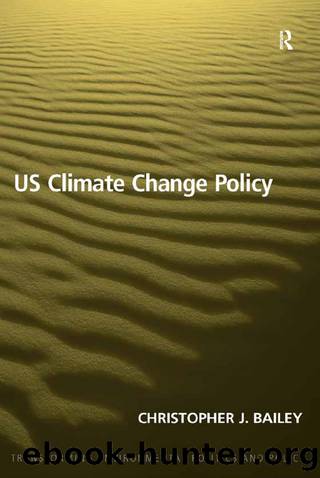Us Climate Change Policy by Christopher J. Bailey

Author:Christopher J. Bailey [Bailey, Christopher J.]
Language: eng
Format: epub
Tags: Public Policy, Science, Global Warming & Climate Change, Comparative Politics, Political Science, Environmental Policy
ISBN: 9781409440178
Google: ZdwyCwAAQBAJ
Goodreads: 52633825
Publisher: Routledge
Published: 2016-02-09T00:00:00+00:00
The 2000 Election
The 2000 presidential election offered voters a choice between two candidates with different views on climate change. Vice President Al Gore had established a reputation as an environmentalist with the publication of Earth in the Balance in 1992 and had played a significant role in brokering the Kyoto Protocol, while Governor George Bush had a record as a supporter of the oil industry and a reputation as a climate change sceptic. Gore made a strategic decision early in the campaign, however, not to emphasise his environmental credentials in an effort to appeal to voters in swing states (Mencimer, 2002). Rather than seeking to persuade voters of the need to take action to reduce greenhouse gas emissions, he chose to speak about technological advances and economic growth in an effort to forestall Republican claims that he had a radical environmental agenda that would damage the American economy. Gore calculated that pushing an aggressive environmental agenda would harm his electoral prospects. Differences between the two candidates on climate change emerged late in the campaign, but Al Goreâs early caution not only allowed George Bush to frame the issue to his advantage but also prompted Ralph Nader to enter the campaign as a standard bearer for the environmental movement. Nader, the Green Party candidate, believed that he offered voters concerned about the environment an alternative to Gore (Nader, 2002).
Climate change rarely figured in the early stages of the 2000 presidential election nomination campaigns. Vice President Al Gore promised that: âI will address the international challenge of global warming with new technologies that create more jobs, and make our economy even strongerâ when announcing his candidacy on 16 June 1999, but did not make any major public statements on the issue until a year later when he sought to counter challenges that environmental protection would lead to increased bureaucracy and economic costs. In a speech given in New York on 13 June 2000 he argued that âThere will be no new bureaucracies; no new agencies or organizations, because not only is the era of big government over, the era of old government is over, too ⦠through the power of free markets, through good old-fashioned American ingenuity, we will dramatically reduce pollution and reverse the tide of global warmingâwhile creating more jobs, not fewer jobs, for our people.â Republicans paid even less attention to climate change in the nomination campaign. Only Senator Orrin Hatch (R. UT) raised the issue when he declared in the Republican Presidential Debate held in Des Moines, Iowa, on 13 December 1999 that: âI donât agree with environmental extremism that would make us uncompetitive with the rest of the world. One of the first things I said I would do [as President] is revoke the Kyoto Accords. The Kyoto Accords place environmental extreme requirements on the United States, and nobody else. And in the final analysis, thereâs no real reasonâscientific or otherwiseâwhy that should occur.â
The lack of attention given to climate change in the early stages of the
Download
This site does not store any files on its server. We only index and link to content provided by other sites. Please contact the content providers to delete copyright contents if any and email us, we'll remove relevant links or contents immediately.
Killers of the Flower Moon by David Grann(3237)
Machine Learning at Scale with H2O by Gregory Keys | David Whiting(2289)
Will by Will Smith(2041)
Guns, Germs and Steel by Diamond Jared(1883)
Borders by unknow(1785)
The Room Where It Happened by John Bolton;(1721)
The Color of Law by Richard Rothstein(1574)
Once Upon a Broken Heart by Stephanie Garber(1484)
Water Rights and the Environment in the United States by John Burch(1414)
Friends, Lovers, and the Big Terrible Thing by Matthew Perry(1327)
Examples & Explanations: Administrative Law by William F. Funk & Richard H. Seamon(1325)
A Short History of War by Jeremy Black(1300)
HBR's 10 Must Reads 2022 by Harvard Business Review(1256)
Pharmacy Practice and The Law by Richard Abood(1254)
The Strength In Our Scars by Bianca Sparacino(1244)
That Every Man Be Armed by Stephen P. Halbrook(1236)
The Guarded Gate by Daniel Okrent(1219)
515945210 by Unknown(1207)
Injustices by Ian Millhiser(1198)
